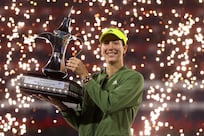As controversies go, it's a rather silly one. Music fans in the UK are currently at each others' throats over an online campaign to deliver the rap-rockers Rage Against the Machine the coveted position of Christmas number one. For years the festive top spot has been reserved for the corniest of musical entries and in the past decade it has been dominated by the winners of Simon Cowell's talent shows, such as The X Factor and its predecessor, Pop Idol.
So the possibility of the Marxist-leaning Los Angeles four-piece making a successful assault on the charts with their 1992 anthem Killing in the Name (now with odds of 3-1, according to the bookmaker William Hill) would be a coup indeed. But the battle lines have not simply been drawn between fans of pop and rock. Music lovers from both side of the spectrum have shown equal praise and scorn for the Facebook-led campaign.
Some have taken exception to the wording used by the group's organisers. It claims they are "fed up about the possibility of another X Factor Christmas number one" and promise to "do something about it". There are more than 700,000 Facebook users signed up to the cause, who are promising to download the track before the end of Saturday. According to the campaign's organisers, the group's supporters include the Sex Pistols frontman John Lydon, the comedian Bill Bailey, the author and actor Stephen Fry, many of the UK's top bands and DJs and even the 2004 X Factor winner Steve Brookstein.
Cowell, however, whose artists have bagged the Christmas number one for the past four years, seems to have taken the matter rather personally. "If there's a campaign, and I think the campaign's aimed directly at me, it's stupid," he said in a press conference in London. The talent show judge argued that the chart bid could unfairly prevent the X Factor winner from reaching mainstream success. "Me having a number one record at Christmas is not going to change my life particularly," he said. "It does, however, change these guys' lives, and we put this opportunity there so that the winner of The X Factor gets the chance of having a big hit record."
On Sunday night, a reported 17 million people in Britain watched 18-year-old Joe McElderry get crowned the winner of the show, beating his fellow singer Olly Murs to the £1 million (Dh5.9m) recording contract. Described as "cherubic", McElderry performed his single The Climb during the final, a country song that was made famous by the US teen star Miley Cyrus. Bookmakers have placed odds of 1-8 on an X Factor number one, but with last year's winner, Alexandra Burke, selling 576,000 singles, RATM could still be in with a shot if the Facebook group's members keep their word.
But even if RATM beat the X Factor winner, some have noted that Killing in the Name, a song about individual choice and responsibility, is a strange pick for a campaign that relies on hundreds of thousands of people doing exactly as they are told. Some have also suggested that Cowell could stand to win either way. Sony BMG doesn't just own his label SyCo, but also RATM's back catalogue. So the conflict is unlikely to ruin his relationship with the music giant.
As a writer at the UK music magazine NME wrote: "There's no better way to stick it to The Man than by swelling the coffers of a major label rock act who've sold over 20 million albums worldwide." Rage Against the Machine formed in 1991 and their self-titled debut became an instant alt-rock classic. The band became almost as well known for their activism as their music. The campaign to return the 17-year-old song to the top of the charts has only become possible thanks to new rules that allow almost all legally downloaded songs to count as singles. The change in 2007 led to a number of songs unexpectedly re-entering the charts, including Luciano Pavarotti's Nessun Dorma, which went to number 24 the week after the singer's death.









